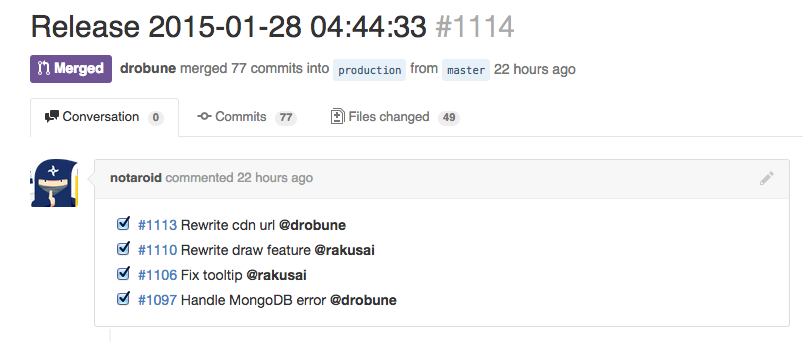github-pr-release
v1.3.6
Published
Create a release pull request by Github API
Downloads
25,231
Readme
github-pr-release
Create a release pull request using GitHub API. Inspired by git-pr-release.
- No dependency on git. You can easily deploy it to Heroku / AWS Lambda / Google Cloud Functions etc.
- Fast because it uses only Github API.
- Written in JavaScript.
Usage
<<<<<<< HEAD
release(config)
=======
API: release(config)
origin/master
Create a release pull request and return Promise.
You must pass a config as an argument.
const release = require("github-pr-release");
const config = {
token: "your github token",
owner: "uiur",
repo: "awesome-web-app",
head: "master", // optional
base: "production", // optional
template: "/path/to/template.mustache", // optional
};
release(config).then(function (pullRequest) {
// success
// `pullRequest` is an object that github api returns.
// See: https://developer.github.com/v3/pulls/#get-a-single-pull-request
});Also, the following environment variables can be used for the config:
GITHUB_PR_RELEASE_OWNERGITHUB_PR_RELEASE_REPOGITHUB_PR_RELEASE_TOKENGITHUB_PR_RELEASE_HEADGITHUB_PR_RELEASE_BASEGITHUB_PR_RELEASE_ENDPOINT
CLI
You can create a release pull request by the following command:
❯ npx github-pr-release owner/repo --head master --base production
# `GITHUB_PR_RELEASE_TOKEN` is required--help:
❯ npx github-pr-release --help
Usage: github-pr-release [repo]
Options:
--help Show help [boolean]
--version Show version number [boolean]
--head [default: "master"]
--base [default: "production"]
Examples:
github-pr-release uiur/github-pr-release --head master --base productionInstall
npm install github-pr-releaseTips
Pull request titles
If one of pull requests of which consist a release pull request has a title like "Bump to v1.0", the title of the release pull request becomes "Release v1.0". Otherwise, it uses timestamps like "Release 2000-01-01 00:00:00" in local timezone.
Specify a message format
You can specify a template to change the message format. Pass a template path to config.template.
release({
token: 'token'
owner: 'uiur',
repo: 'awesome-web-app',
template: './template.mustache'
})The default template is below. The first line is treated as the title.
Release {{version}}
{{#prs}}
- [ ] #{{number}} {{title}} {{#assignee}}@{{login}}{{/assignee}}{{^assignee}}{{#user}}@{{login}}{{/user}}{{/assignee}}
{{/prs}}GitHub Enterprise
If you use this plugin in GitHub Enterprise, you can specify endpoint domain for GitHub Enterprise.
release({
token: 'token'
owner: 'uiur',
repo: 'awesome-web-app',
endpoint: 'https://github.yourdomain.com/api/v3'
})Example
GitHub Actions
Creating release pull requests can be automated using GitHub Actions.
Create .github/workflows/create-pr-release.yml with the following content:
name: Create release pull requests
on:
push:
branches: [master]
jobs:
build:
runs-on: ubuntu-latest
steps:
- uses: actions/checkout@v2
- uses: actions/setup-node@v2
with:
node-version: 16.x
cache: "yarn"
- run: yarn install
- name: Create release pull requests
run: |
npx github-pr-release $GITHUB_REPOSITORY --head master --base production
env:
GITHUB_PR_RELEASE_TOKEN: ${{ secrets.GITHUB_TOKEN }}hubot

release = require('github-pr-release')
module.exports = (robot) ->
robot.respond /release/i, (msg) ->
release(config).then((pullRequest) ->
msg.send pullRequest.html_url
)
.catch((err) ->
msg.send("Create release PR failed: " + err.message)
)Development
The release flow of github-pr-release is managed with github-pr-release itself.
It creates a release pull request when merging a topic branch or pushing to the main branch. The update can be published by merging a release pull request.
License
MIT


